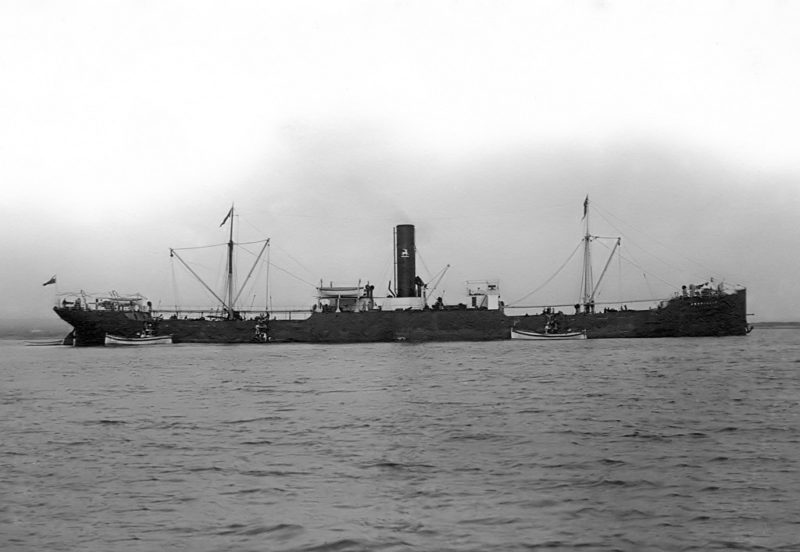
Long before air travel allowed change of crews at short intervals of four or five months, many British tramp crews faced long voyages of up to three or four years in duration without calling at any British port. Single men for the positions of Master, Mates, Engineers and deck crew were the obvious candidates, as they could withstand the very long separations from friends, families and loved ones, whereas married men could not take such years of separation.
These single men had always dreamed of a life at sea for a long time since boyhood, travelling the seven seas in a perpetual whirl of new ports, places and adventure, quite divorced from the reality of life ashore at home. The nature of trading was such that the tramps operated mostly on voyage charters only, fixed by their owners and agents on the Baltic Exchange in London, with several time charters varying from as little time of one month up to two years in duration. British shipping had a huge monopoly of world trade during the late Victorian and Edwardian periods, and thus sending tramps to the ends of the earth for profitable trading was the expected norm of shipowners.
We will look at several very long voyages in detail that had durations of up to or over four years without a single or almost no calls at British ports for discharge, crew changes, refits, dry dockings or special surveys.
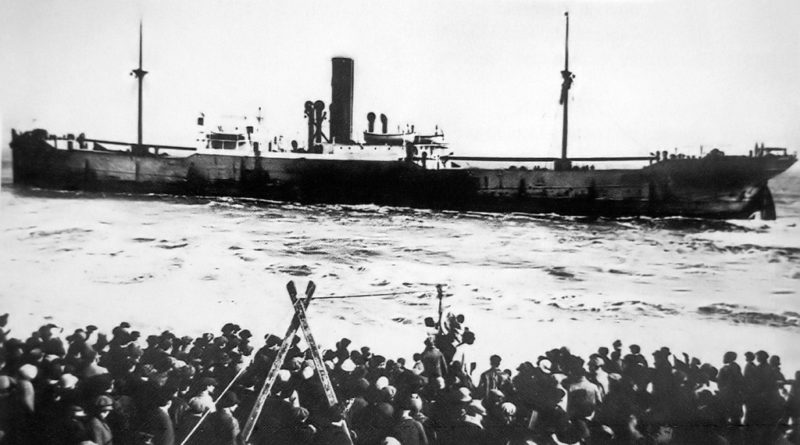
QUEEN LOUISE
4 years, 3 months 5 day voyage duration
The first of these was on the Queen Louise, a three island tramp of 3,385 grt launched at the South Dock of Sunderland on 12th August 1893 by Bartram, Haswell & Company for Thomas Dunlop & Sons Ltd. of Glasgow. She was completed as Yard number 155 in September 1893 and had dimensions of overall length of 330.0 feet, moulded beam of 42.5 feet, and moulded depth of 19.6 feet. A service speed of nine knots was obtained from a triple expansion steam engine by John Dickinson of Sunderland. She was first registered on 15th September 1893 and her crew of thirty came onboard for her maiden voyage in the coal out, grain home trades of the ‘Eternal Triangle’ route to the Black Sea, with coal outwards to Italy, the Adriatic or Greece, followed by ballasting to the Black Sea to load grain for North European ports.
She sailed with coal from Cardiff on 29th October 1899 for Gibraltar, Port Said, Djibouti, Aden (loaded salt), Calcutta, Rangoon, (loaded rice), Yokohama, Kobe, Moji, Manila, Sourabaya, (loaded sugar), Tegal (topped off with sugar), Colombo (bunkers), Aden, Port Said, Algiers, New York (ballast) to Norfolk (Va) to load coal for Coronel and Antofagasta in Chile, Iquique (loaded nitrates), Bahia, St. Lucia (bunkers), New York. She then repeated this sequence of four more return voyages of coal out from Eastern Seaboard ports U.S.A. to Chilean ports, and loading with nitrates at Iquique for New York, where she arrived for discharge on the last day of January 1902.
She sailed from New York on 2nd February 1902 for Algiers (bunkers), Port Said, Perim (near Aden), and Bombay, where she reloaded for Perim, Suez, Algiers (bunkers), Gibraltar, Baltimore, Philadelphia and New York. She sailed again from New York on 6th August 1902 for Malta (bunkers), Port Said, Colombo, Sabang (bunkers), Singapore, Kobe, Kutchinotzu, and Hiogo in Japan. She sailed from Singapore on 2nd December 1902 for Calcutta, Suez, Algiers (bunkers), Philadelphia and New York.
She sailed again from New York on 10th March 1903 for St. Vincent (bunkers), Durban, Newcastle (NSW) loading coal for Sydney (NSW), Brisbane, Port Elizabeth via Mauritius, and then called at Durban, Colombo, Calcutta, Bombay, Suez, Algiers (bunkers), Rotterdam and Cardiff. She arrived at the South Wales port on 2nd February 1904, with the crew going ashore to see what changes had occurred in their families during an absence of over four years and three months. Queen Louise was later sold in 1911 to E. Corentes and G. Kalagerakos of Piraeus and renamed Anastasia under the Greek flag. She met her end on 20th July 1911 when she stranded in fog at Cape Roncudo near La Coruña while on a voyage from Rotterdam to Genoa with coal, salvage being abandoned a month later.
The tramp Queen Louise was named for the Queen of Denmark, and she gave permission for her name to be used, with her representative present at the launching of the ship. The tramp is also remembered for the salvage of the Hain tramp Trefusis in January 1910. Queen Louise had sailed from Algiers one morning in January 1910 and ran straight into a westerly gale.
The disabled Trefusis was encountered forty miles later with the thrust shaft of her propeller broken. When the weather moderated, she took Trefusis in tow, and after several five inch steel towing wires had broken, the Second Officer volunteered to attach another by being slacked away along the existing fraying wire over the sea and sitting in a boatswain’s chair. This tricky job took two hours with the Second Officer continually dipped in the sea when the tow rope sagged down. Trefusis was towed into Almeria in the evening of 26th January 1910. The salvage award of £3,000 was made, of which £2,120 went to the owners, £250 to her Master, and the remainder divided amongst the crew, with the Second Officer receiving an additional £50 for his gallant efforts.
Thomas Dunlop & Sons of Glasgow had several tramps with ‘Queen’ names in their fleet at this time, including Queen Christina, Queen Adelaide, Queen Anne, Queen Olga, Queen Eleanor, Queen Mary, and Queen Elizabeth of 1911. The latter three island tramp was the first ship to circumnavigate the world without crossing the equator. She sailed from the U.K. through the Mediterranean and Suez Canal to Far East ports, and came home via the Panama Canal a few days after the canal had opened in 1914. This Glasgow fleet lost four tramps out of a fleet of ten during World War I, and acquired two more as replacements.
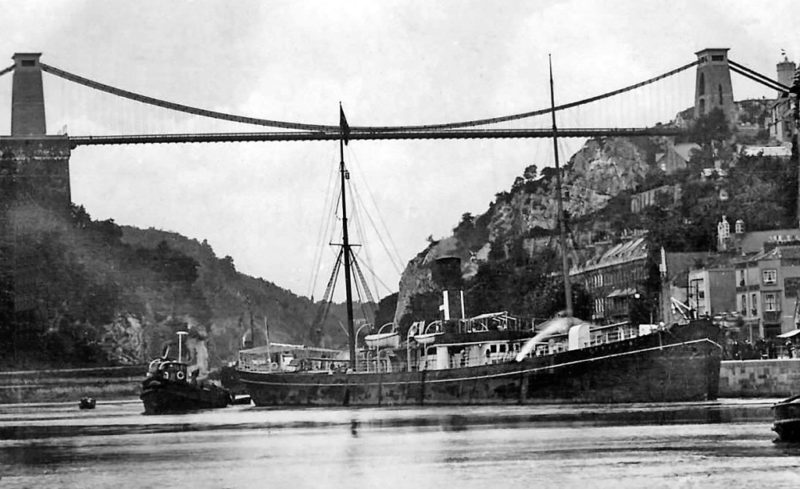
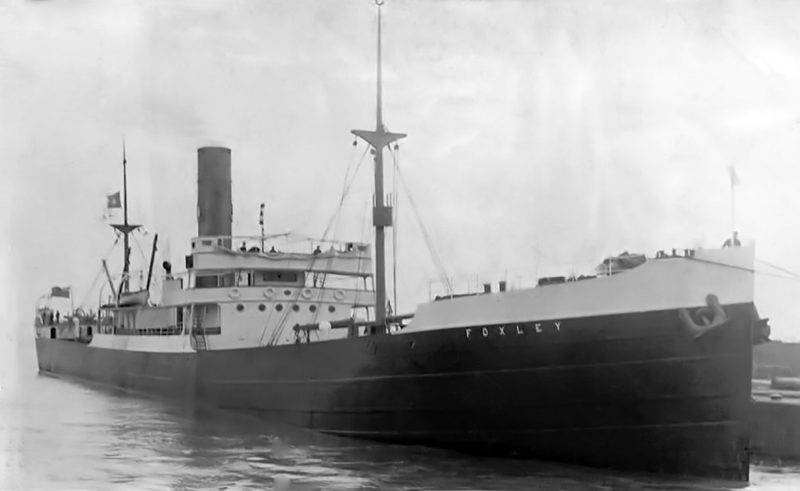
FOXLEY
3 to 4 year voyage durations
Foxley was a three island tramp of 4,274 grt and 7,300 dwt and launched on 24th February 1906 by the Northumberland Shipbuilding Company yard at Howdon-on-Tyne for Houlder, Middleton & Co. Ltd. of 8/9 St. Helen’s in London and registered under the Reliance Shipping Co. Ltd. one month later. She was of overall length 372 feet, moulded beam of 48 feet, and moulded depth of 30 feet. This design by her builders was popular with tramp owners and 46 of this class had been completed by the end of 1906. In 1907, the design was stretched by twenty feet to increase the deadweight to 7,500 tons and a total of over ninety tramps were built to the stretched design. She had four hold and four hatches of 24 feet by 16 feet, with a service speed of ten knots from a triple expansion steam engine. She had three exact sisters in the Houlder, Middleton & Company fleet in Purley of 1906, Bramley of 1906, and Farley of 1907, with another ten similar tramps with names ending in ‘ley’.
Foxley sailed from the Tyne on 6th April 1906 on her maiden voyage to New York, and loaded back across the Atlantic for the Suez Canal and ports in Malaya, China and Japan, and returned to New York via Colombo and the Suez Canal. After a stop-over at New York of four weeks, she again sailed for Far Eastern ports via Suez, before returning to Barry on 22nd May 1908 to load coal. She sailed from Barry three days later for New York, Montevideo, Buenos Aires, and then returned to Cuxhaven, where she was in collision with the British steamer Newark, losing her anchor and chain. She also grounded at Nordeney in the Frisian Islands and returned to Barry for dry docking in March 1909.
She sailed from Barry with coal on 30th March 1909 for Buenos Aires returning to Baltimore and Norfolk (Va) to load coal for Montevideo, where she arrived with heavy weather damage, repairs taking six weeks. She then sailed via the Magellan Strait to Mazatlan (Mexico), Eureka (Mexico), Astoria (Oregon), Portland (Oregon) on the Columbia river and Willamette river. She sailed from Oregon with timber for Sydney (NSW) for discharge and reloading for Cape Town, Cuxhaven, Szczecin and returned to Barry in September 1910.
She sailed from Barry with coal on 11th September 1910 for New York and then Mediterranean ports, and through the Suez Canal to Singapore, Vladivostock and Hong Kong. She loaded in the Far East with grain and discharged at Hull on 18th April 1911, sailing nine days later for Swansea to load coal for New York and Baltimore, ballasting to Rosario and Villa Constitucion in Argentina to load grain in the Parana river. She then bunkered in South Brazil for Colombo, where she arrived on 5th October 1911. She then loaded general at Calcutta for Newcastle (NSW), Valparaiso, Pisagua, Iquique, Tocopilia and Mejillones, loading nitrates at the last four ports. She bunkered at Coronel in Chile for the passage of the Magellan Strait, where she struck a submerged pinnacle of rock on 28th March 1912 while entering the Strait and was lost. Unfortunately, 36 of her crew were lost, but her Master and three officers survived.
The near sisters Bisley of 4,929 grt built by the Connell yard on the Clyde in 1907, and Shirley of 4,850 grt built at Sunderland in 1913 were also lost on the route from New York to the Plate and on to the West Coast of South America. Tymeric of 3,314 grt of the Andrew Weir & Company fleet, which used the same New York agents of Houlder, Weir & Boyd Inc, was aground in the Straits of Magellan in 1904 on the return voyage from Chile with nitrates for the U.K., but was later salvaged and returned to service.
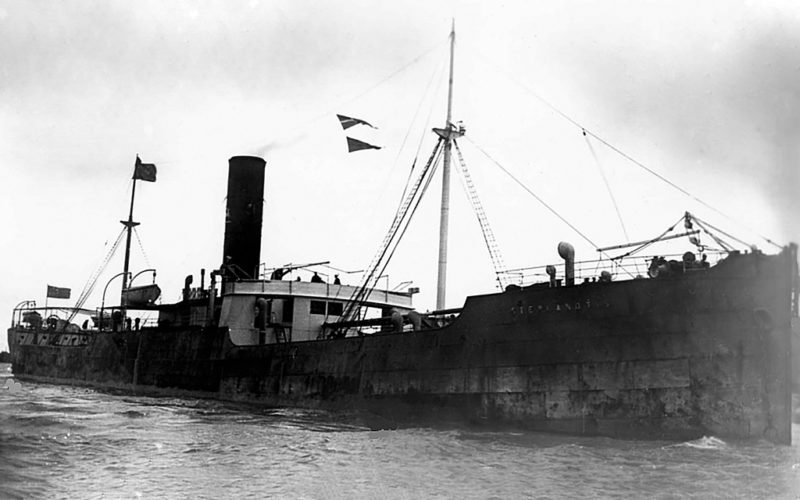
AMARYLLIS & STEPHANOTIS
3 to 4 years voyage durations
The Stag Line three island tramp Amaryllis was launched by Mrs. Alfred Robinson on 16th June 1904 at the Tyne Iron Shipbuilding Co. Ltd. at Howdon on Tyne as Yard number 149 and completed one month later. She had dimensions of overall length of 350.0 feet, moulded beam of 48.0 feet, moulded depth of 28.5 feet, and a loaded draft of 23.0 feet with a gross tonnage of 4,064 grt and of 6,250 dwt. She was equipped with a triple expansion steam engine of cylinders 24.5, 41.0, 68.0 inches in diameter with a stroke of 48 inches, with steam raised by three boilers working at 180 pounds per square inch to give a service speed of twelve knots. She was equipped with eight derricks and five powerful winches on two masts to serve her four holds and hatches. The crew were made up from Capt. Lasb, a Chief Engineer, two Mates and two Engineers keeping watch and watch about, six Lascar seamen, and a dozen firemen and trimmers. She sailed from the Tyne in ballast under Capt. Lasb for Barry to load coal for her maiden voyage to Cape Town.
She arrived at Cape Town in August 1904, and then ballasted to Aden to load salt for a long series of voyages to Mombasa, Karachi, Bombay, Calicut, Colombo, Calcutta, Rangoon, Moulmein, Penang and Singapore. She also loaded coal at Calcutta with a total of nine or ten voyages completed per year in the hard grind of salt and coal cargoes in the Indian Ocean. She deviated from this trade in March 1906 to proceed through the Suez Canal to Torrevieja in Spain to load a cargo of salt for a U.K. port and moved around to the Tyne for dry docking. She then returned to her Indian Ocean trades of salt and coal for the next 18 months until she was wrecked on 7th February 1908 at Kalkudah in Ceylon while on a voyage from Calcutta to Bombay with a cargo of coal.
Stephanotis was her exact sister as Yard number 148 launched on 16th April 1904 from the same yard and completed one month later. She loaded coal on the Tyne for Cape Town and then entered the same salt and coal trades as her sister for the next four years until she returned to the Tyne in 1908 for dry docking. After a further four year period in the same Indian Ocean trades she returned to the Tyne in 1912 for dry docking, and then completed a further three years trading in the Indian Ocean before she loaded 6,475 tons of wheat at Karachi in May 1915. She sailed for Hull and bunkered at Aden, Port Said and Gibraltar on the way to arrive off the Humber estuary on 15th June 1915. The discharge of her wheat was completed three days later, and after up to a year of further trading for Stag Line, she was sold to Brown, Jenkinson & Co. Ltd. of London and renamed Hackensack. She was torpedoed and sank on 25th April 1917 by U-82 when 180 miles NW by W of the Fastnet with a cargo of Cuban sugar loaded at Cienfuegos for Queenstown via Halifax (NS).
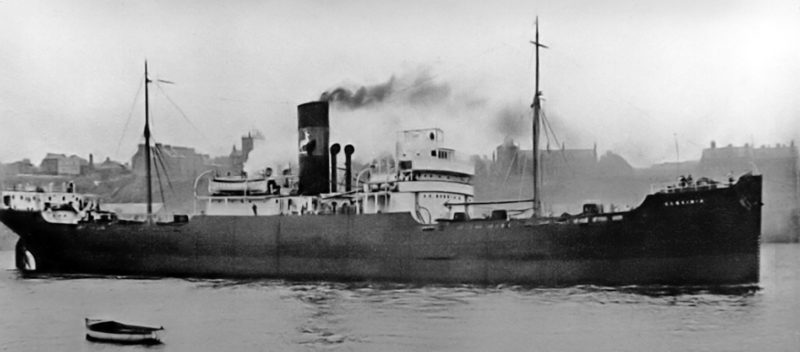
GLOXINIA
3 or more years voyage durations
The Stag Line tramp tanker Gloxinia had a very interesting career of 31 years with the North Shields company, often making long voyages away from the U.K. The temptation to purchase second-hand tramps was resisted in the post-war boom of 1920, with only a new ‘War C’ type purchased and renamed Gloxinia of 5,540 dwt in September 1920 from the Tyne Iron Shipbuilding Company yard. However, she did not trade immediately and instead went straight into dry-dock at Smith’s Dock Co. Ltd. at North Shields for conversion into a tanker, carrying oil or molasses. She emerged in April, 1921 at a cost of £236,234, and at the Annual General Meeting of Stag Line on 16th December, 1920 there were two possible very remunerative charters for her, but it was decided to postpone a decision on which one to accept until the meeting had finished, by which time the market had slipped and both charters disappeared.
However, she finally sailed on charter to the Anglo-Persian Oil Co. Ltd. (later BP) to Abadan at the end of April, 1921 to load oil for the U.K. The Master, officers and engineers lived ‘midships and the crew lived aft, and after her return from the Persian Gulf they were to be employed for the next seven years carrying 35 cargoes of oil either from Batum on the Black Sea or American Eastern seaboard and Gulf ports to the U.K. Gloxinia then sailed on 2nd January, 1929 to the snow and ice of Grytviken on South Georgia to load whale oil for Liverpool, followed by a similar voyage from Cardiff to South Georgia on 4th November 1929. She also made three voyages during 1929/30 carrying fuel oil or gas oil from Philadelphia or Constanza to Manchester and Hamburg.
Gloxinia was laid up at Liverpool from 12th July, 1930 for three months to 10th October before being brought around to the Tyne to be laid up for over six years during the length of the Depression until 26th January, 1937. As a tanker, she received compensation money from other shipowners in the Tanker Pool, a form of ‘unemployment benefit’ paid by the owners of tankers in employment. The tanker Gloxinia was re-activated by the strong demand created by the Spanish Civil War and carried eight cargoes of oil from Batum to Spain. On one voyage she called at Marseille and was quickly cleared for her destination of Valencia. She was seen approaching there by German bombers, who then heavily attacked that harbour during the night, but Gloxinia escaped after a quick discharge and moved along the coast to Barcelona during the night.
Gloxinia had survived the war, sailing on many Transatlantic convoys with lubricating oil from Philadelphia or New York for Stanlow, and with foul smelling herring oil from Iceland to Manchester in convoy. She was finally converted to oil burning in May 1944 to reduce the amount of smoke emanating from her funnel while sailing in convoy. She sailed from the Tyne in May, 1945 under Capt. Mortimore, who had joined her as Chief Officer at the end of 1944, to carry urgently needed oil supplies around the Eastern Mediterranean from Haifa. She carried 76 cargoes of oil to war ravaged Piraeus and Alexandria, and then loaded for home in May, 1948. She then sailed from the Tyne for only her second ever visit to Abadan, but on 24th July, 1948 she stranded on the east side of Jezirat Farur Island off the coast of what is now Iran. Her forepeak was damaged, and after lightening ship by the transfer of 1,200 tons of oil to barges she was refloated five days later. Repairs consisted of filling the forepeak with cement at Suez during August and September of 1948. During the next year, she carried thirteen cargoes of oil to Egypt from either Abadan or Haifa, including one month as a bunkering craft in the red heat of Aden.
She then spent two years on charter to Shell, sailing from the Tyne on 21st July, 1949 at the start of the first of two 12 month charters taking bunker grade ‘C’ fuel oil around the West Indies and to Dakar and the U.S.A. from Willemstad on Curacao or Oranjestad on Aruba. She visited Kingston (Jamaica), San Juan and Ponce (Puerto Rico), Havana and other ports in Cuba, Puerto Limon, Martinique, Dakar, and Bucksport (Maine) to the north of Portland on the beautiful Penobscot river near Bangor. She bunkered at Las Palmas de Gran Canaria in December 1950 but was in collision there with the Spanish general cargo ship Castillo Bellver of 4,718 grt and built in 1923 for Empresa Nacional Elcano by J. L. Thompson at Sunderland. Gloxinia suffered slight damage to her fo’c’stle sheer strake.
Capt. Mortimer was her long serving Master and a replacement had to be found in 1950 when his wife threatened to leave him if he did another voyage, and he had to decide which love was more important, Gloxinia or his wife! Gloxinia was then sold to Italy for £115,000 (half her original cost) in July 1952 following strong demand due to the Abadan oil crisis, and was converted back to dry cargo in 1955 as Vittoria O and traded as such until she finally arrived for breaking up at La Spezia on 3rd April 1959 after a long and eventful career.
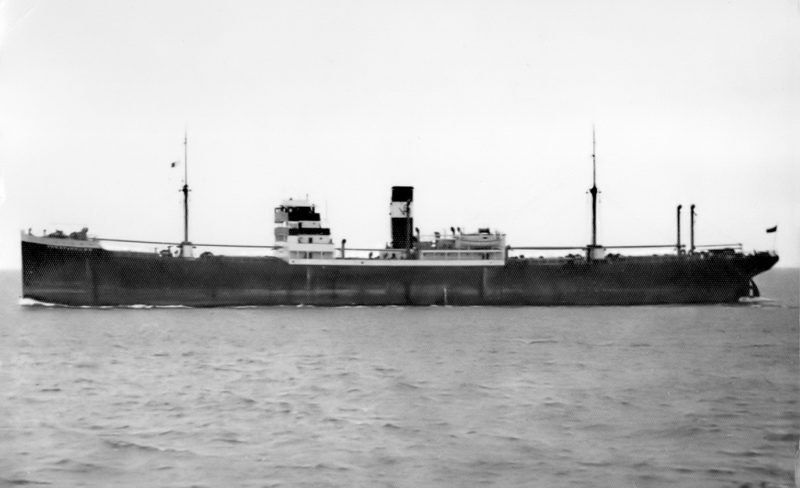

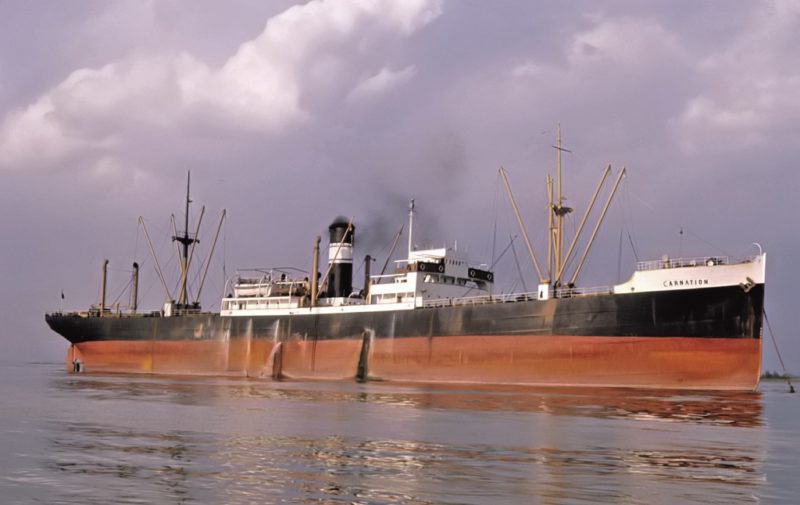
SHEAF HOLME
2 years and 3 months voyage duration
Sheaf Holme was a motor tramp of 4,811 grt and 8,750 dwt completed in August 1929 by the William Pickersgill & Co. Ltd. yard at Southwick in Sunderland for the Sheaf Steam Shipping Co. Ltd. with W.A. Souter & Co. Ltd. as managers. She was of split superstructure design with the engineers accommodated aft of cross bunker hatch three, and her Master and navigating officers accommodated in the bridge. She had dimensions of overall length of 406.5 feet, moulded beam of 54.5 feet, and moulded depth of 24.7 feet, with a fo’c’stle of length 38 feet. She carried 1,155 tons of water ballast in her double bottom spaces, forepeak and aftpeak, and was equipped with two masts and two sets of posts and a good array of a dozen derricks for cargo handling. She had five holds and two decks including a shelter deck, with seven bulkheads including the collision bulkhead to main weather deck level. She was powered by the famous three cylinder 2SCSA Doxford oil engine to give a service speed of twelve knots.
Sheaf Holme sailed from Sunderland on her maiden voyage to load soyabeans at Hamburg for Chilean ports, followed by a cargo of nitrates loaded at Iquique for Hawaii, and then ballasted to Vancouver to load timber for Durban and Lourenco Marques via Cape Horn to avoid Panama Canal charges. She then ballasted across the Indian Ocean to load wheat at Adelaide for Shanghai, where she loaded a general cargo for a Transpacific voyage. She loaded timber at Vancouver and British Columbian ports to voyage along the Juan de Fuca Strait past Cape Flattery for Melbourne and Sydney (NSW). She loaded general cargo at Australian ports for Fiji and Samoa, and then ballasted to Vancouver and British Columbian ports to load timber for Tahiti and New Zealand. She loaded wool at Lyttelton and general cargo at Melbourne and Sydney (NSW) for Fiji and Samoa. She again ballasted to Vancouver and British Columbian ports to load timber for Samoa, Melbourne and Hobart in Tasmania. The crew were well aware that there were over two hundred tramps laid up on the Tyne at this time in 1931 in the middle of the Depression, and their last Pacific voyage was when she sailed from Sydney (NSW) with a cargo of wheat for Belfast, Dublin and the Tyne via Cape Horn.
Sheaf Holme survived the war, and was then time chartered for five years to Strick Line from 1946 for trading to the Persian Gulf. At the end of this charter in 1951 she was sold to German owners at Kiel, Reeder-Union A.G., and renamed Dusternbrook, and then in 1954 to Hamburg Sud renamed Bonanza, and lastly in 1960 to Lemos & Pateras of Greece and renamed Carnation. She arrived on 12th May 1965 at Valencia for breaking up.
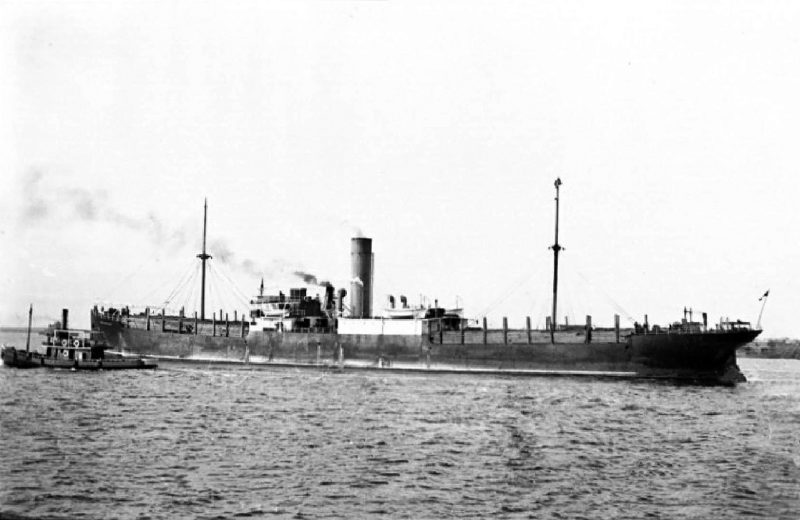
CAPE FINISTERRE
1 year, nine months voyage duration
Alexander Park Lyle of Glasgow was a wealthy business man with sugar and shipowning interests. His father, Abram Lyle, had been prevented from opening a new sugar refinery at Greenock alongside his existing sugar refineries, and moved to London and teamed up with Henry Tate to form the world renowned sugar company of Tate & Lyle Ltd. Archibald Lyle had just graduated from Oxford University in 1903, and his father, Alexander Park Lyle, decided to set up his son as a shipowner, registering the Lyle Shipping Co. Ltd. on 27th March 1903 to trade the new tramp Cape Antibes of 2,549 grt from the William Dobson yard on the Tyne. The fourth tramp in the Lyle fleet was Cape Finisterre of 4,380 grt delivered in November 1907 at a cost of £50,203 by the Russell yard at Port Glasgow for the single ship company of the Cape Finisterre Steamship Company with a paid up capital of £20,000. The 200 shares of £100 each were 45% owned by the Lyle family, with the remainder held by the Shearer, Birkmyre and Macfarlane families.
Cape Finisterre sailed from Swansea in ballast in May 1909 for North America and then on to the Caribbean to take a sugar cargo loaded in Cuba to Canada. She then loaded coal at Portland (Maine) for Australian ports via the Panama Canal, and then ballasted to Manila and docked there in July 1910. She then made several short voyages in the Far East before sailing for Seattle and Vancouver. She returned to Australian ports with lumber and traded on the Australian coast for two more voyages before sailing for Durban to load coal for Colombo. She then obtained a lucrative charter home from the Indian Ocean to arrive in the U.K. in January 1911. She continued to trade for the Lyle Shipping Co. Ltd. until she was torpedoed and sunk on 2nd November 1917 by a German U boat when near the Manacles rocks while on a voyage from Falmouth to Brest, with the loss of 35 crew members and only six men survived to be rescued.
CROMARTY
1 year voyage duration
Cromarty was a Doxford Economy tramp of 4,974 grt and 9,115 dwt and fitted with the economy version of the three cylinder 2SCSA Doxford oil engine, notable for the low economy of only 6.5 tons of fuel oil per day and eleven knots speed over very long voyages. She was launched as Skipsea on 21st July 1936 and completed in September 1936 as Yard number 628 for the Sea Steamship Co. Ltd. of Hull, with William Brown, Atkinson & Co. Ltd. as managers. Two years later, she was sold to the Sutherland Steamship Co. Ltd. of Newcastle with Sir Arthur Sutherland as manager, and renamed as Cromarty. He had ordered the prototype of the Doxford Economy design in 1934 at a cost of £100,000 as a flush decked shelter decker with composite superstructure ‘midships for Master, officers and engineers accommodation, with the crew housed aft in the ‘tween spaces. There were four holds with five hatches with a deep tank between number 2 hold and the engine room. The cargo gear consisted of ten derricks of five tons capacity on two masts and two kingposts. The exhaust gases from the main engine were passed through a boiler to supply steam for auxiliary use at sea e.g. the winches and steering gear.
Sir Arthur Sutherland ordered or purchased eight examples of the Doxford Economy tramp in the 1930s, which were completed as Sutherland of 1935, Kinross of 1935, Stirling of 1935, Caithness of 1935, Peebles of 1936, Ross of 1936, Cromarty purchased in 1938 as Skipsea, and another Sutherland completed in 1940. Several of these were sold off or became war casualties to leave only Cromarty, Caithness, Peebles and Sutherland of 1940 in the fleet in 1946. Cromarty sailed on 21st July 1947 to load Cuban sugar at Caibarien and Nuevitas for London, and then loaded grain at Galveston for Hull, each voyage taking three months. She was then chartered by Palm Line for several voyages to West Africa, calling at Lagos, Burutu, Calabar, Port Harcourt, Sherbro, Lome, Takoradi, Cape Coast, Freetown and Dakar to return for discharge with vegetable oils from her deep tank into shore tanks at Liverpool, each voyage taking three months.
Cromarty then sailed from the Tyne on 9th December 1949 for London to load for Sydney (NSW) passing under the graceful sweep of the Sydney Harbour Bridge, Brisbane, and Newcastle (NSW), where she loaded grain for Yokohama, followed by a ballast voyage to Fiji to load sugar for Vancouver, where she discharged and then loaded a timber cargo for Liverpool, arriving in early December 1950.
Cromarty continued trading with Palm Line charters to West Africa, coal cargoes from the Tyne and grain from Philadelphia until she was handed over to Rederi A/B Bris (John Larsson, Gothenburg) on 17th December 1953 and renamed Ostbris. She became Carla of Gothenburg in 1958, Steckenpferd in 1959 for VEB Deutsche Seereederei of Rostock, and Pelopidas 2 in 1968 for the Troodos Shipping & Trading Co. Ltd. with V. Haji Ioannou as manager. She was finally broken up at Kaohsiung in June 1973 after a long career of 37 years.
HOUNSLOW
2 year 4 months voyage duration
The half trunk deck tramp Hounslow of 3,751 grt had been launched back on 27th April 1899 by the Ropner & Sons yard at Stockton as Barton for Webster & Barraclough of West Hartlepool and completed a month later as Yard number 358. She had dimensions of overall length of 330.1 feet, moulded beam of 47.1 feet, moulded depth of 25.8 feet, with a triple expansion steam engine by Blair & Company with cylinder diameters of 24,40 and 65 inches and a stroke of 42 inches. She was purchased in 1918 for the twenty strong tramp fleet of Watts, Watts & Co. Ltd. of London, which had begun as Watts, Milburn & Company in North East England fifty years previously.
Fourteen tramps had been lost during World War I to enemy action, and thus fourteen tramps were purchased after the end of the war to bring the fleet strength back up to the pre-war level of twenty tramps. Hounslow was her new name of a London borough, and she sailed from the Tees in ballast in August 1920 due to a miner’s strike with no coal cargo available. Five hundred tons of pit slag formed her ballast for the twenty one day voyage to Baltimore. The pit slag was dumped overboard by means of a wooden chute, made by the carpenter, while the tramp loaded a cargo of coal for Alexandria. The Chinese cook died during this Transatlantic passage and his body was sewn up in a canvas bag and slid over the side in a small ceremony, which included a map for the dead cook to navigate himself back to his native land, and sewn into the bag.
Hounslow then ballasted through the Suez Canal to Abu Zeneme in the Gulf of Suez to load manganese ore for Dunkirk. She then loaded a cargo of coal there for Perim Island near Aden at the southern end of the Red Sea. She then sailed south in ballast to Durban to load coal for Perim Island again, and she continued in this Indian Ocean coal trade for the next six months or more from Durban to Port Sudan, Karachi, Perim Island and Colombo.
She then ballasted to Christmas Island (10°24′ South, 105°30′ East) to the south of Java to load phosphates for Fremantle. The sea is very deep here right up to the phosphate jetty, and she had an anchor with 90 fathoms of chain ready when she made her approach. When the flukes of the anchor touched the rock shelf at the start of the shallow water, coir rope springs were run ashore from the bow and to another buoy astern. Unless the weather was fine, tramps put to sea at night, and sea watches were maintained during phosphate loading.
Hounslow discharged the phosphates at Fremantle and then ballasted to Bangkok to pick up a cargo of rice, but due to the accumulation of weed on the bottom of her hull she arrived too late at Bangkok, and then waited at anchor for two weeks for further orders. She then ballasted back to Christmas Island to pick up more phosphates, this time for Stockholm. She was forced to deviate to obtain bunker coal at Brooketon in Brunei before reaching Christmas Island. The long voyage to Europe was very slow and took sixty days due to the weeds and barnacles on her hull, and was so slow that she ran out of bunker coal before reaching Aden, and was forced to burn wooden cargo battens, the spare hatches, and the wooden casing from the donkey boiler, and anything else that would burn, to make port. She made two more calls for bunkers at Algiers and Dartmouth before finally reaching the Stockholm archipelago in December 1922, and she then returned home to load another coal cargo.
Hounslow was sold in 1929 to the McAllum Steamship Co. Ltd. of London and renamed Cliddesden, and passed a year later to the Theseus Steamship Co. Ltd. of Syra with Manuel Kulukundis as manager, being renamed Theseus. She later arrived on 30th October 1932 at La Spezia for breaking up.
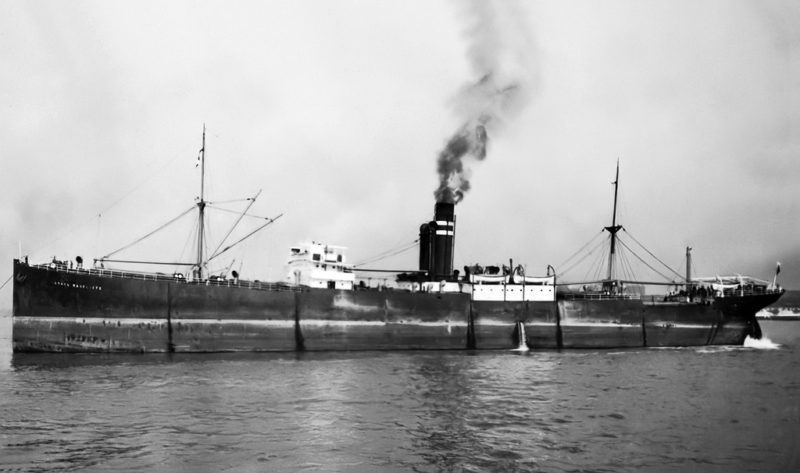
ETHEL RADCLIFFE
1 year voyage duration
The slow speed of an old steam tramp could also cause depression amongst her crew. The big six hold steam tramp Ethel Radcliffe of 5,673 grt and 9,525 dwt was launched on 29th June 1920 at the Craig, Taylor yard at Stockton and completed four months later as Yard number 196. She had dimensions of overall length of 415.2 feet, moulded beam of 55.5 feet, moulded depth of 26.6 feet, with a best speed of nine knots from a triple expansion steam engine by Blair & Company of Stockton. The latter had cylinder dimensions of 28, 46 and 75 inches with a stroke of 48 inches, but continually gave trouble and reduced speed despite her very high construction cost of £274,019. She sailed on her maiden voyage under Capt. M. Mathias of Cardigan from Barry with coal on 11th December 1920 for Port Said, and then ballasted down to Mauritius to load sugar at Port Louis for London, arriving back in early June 1921. She then made another eleven voyages up to the last few days of 1924 with South Wales coal from Barry or Cardiff to Galveston, Texas City, Norfolk (Va), Baltimore, Rio de Janeiro, Buenos Aires, Bahia Blanca, Santos, Rosario, Karachi, and Bombay, usually returning with wheat. These voyages took from four to seven months in duration.
Ethel Radcliffe was laid up for 270 days at Newport during 1930/31, but later sailed under Capt. Sheppard in early 1938 with a cargo of Welsh coal from Barry for Port Said, then loaded salt at Aden for Moji in Japan, and then ballasted down to Port Kembla (NSW) to load concentrates for Antwerp. She had no wheelhouse with absolutely no protection whatsoever from the weather for the Officer of the Watch (OOW) or the helmsman, and no steam heaters in her cabins, and only very basic coal burning stoves in the mess. The very best top speed when new was only nine knots, but this fell as low as an average of only 5.8 knots when she had been away from her base at Cardiff of owners Evan Thomas Radcliffe & Co. Ltd. for some while. The long homeward voyage with bunker stops at Fremantle, Durban, Cape Town and Fremantle caused the cook to commit suicide by jumping overboard. This further depressed the crew, and it was with very low spirits when they eventually reached Antwerp from Port Kembla (NSW) in 112 days, slower than the sailing ships of a century earlier. She returned to Cardiff to load more Welsh coal in the last few days of 1938. She was seriously damaged in an E-boat attack off the Norfolk coast on 17th April 1941 and beached at Great Yarmouth, and then destroyed by bombing on 16th May 1941.
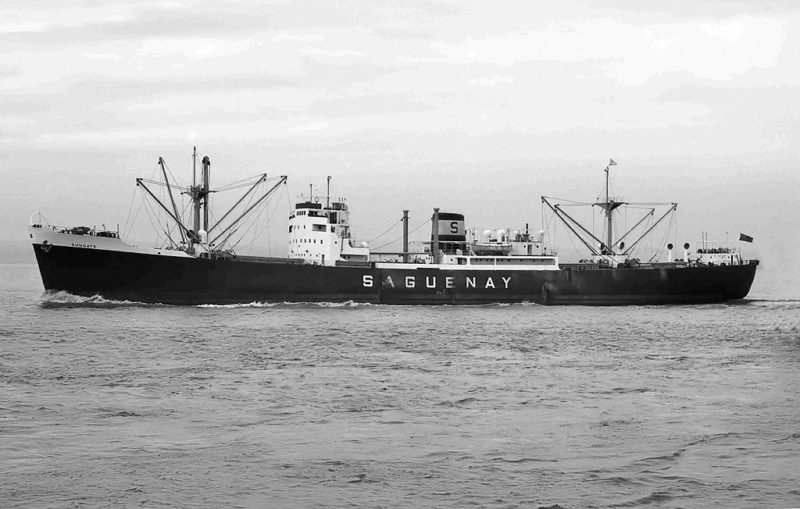
SUNGATE & BAXTERGATE
2 year & long term time charters
In 1950, Saguenay Terminals of Canada had a fleet of eleven owned vessels and a much bigger chartered fleet of eighty vessels, this chartered fleet growing to more than ninety ships by 1959. They were needed for a new triangular trade, when the Saguenay river was blocked by ice for four months of the year, of an eastward trade from ice free ports such as Halifax (NS) to U.K. and Continental ports, and then sailing south west to Caribbean ports with manufactured goods, and finally northbound from Georgetown, Mackenzie in the Guianas and Chauguaramas on Trinidad with bauxite to Port Alfred on the Saguenay. A trade route also ran from the Eastern seaboard of Canada via the Panama Canal to West Coast ports of Canada and the United States of America. The North Atlantic trade route operated as an independent, non Conference line from its inauguration on 2nd January 1954, especially for the needs of Canadian shippers, whose costs had escalated to the point that they could not compete in European markets due to the higher transport costs of the Conference lines. Thus, Saguenay Terminals began to serve the needs of its parent company of Alcan and of the export needs of Canadian shippers on long term contracts of up to two years at fixed freight rates.
The second leg of the triangular route was a direct fast service from British and North Continental ports to Barbados, which had a bauxite loading terminal, Trinidad and Demerara, calling at the Dominican Republic, Haiti, southern ports of Cuba, Antigua, Dominica, Montserrat, Nevis, St. Kitts, St. Lucia, Grenada, St. Vincent, Tobago and at Caripito in Venezuela if there was sufficient cargo inducement or transhipment. The U.K. loading agents were Joseph Constantine & Sons Ltd. in London, and the service was run jointly with the Caribbean service of T. & J. Harrison Ltd. The final leg was the loading of bauxite for the Alcan smelter on the Saguenay river at the innermost port of Port Alfred. Many British tramps were taken on two year charters and given a prefix ‘Sun’ to their names.
Sungate of 10,800 dwt was completed by the Burntisland Shipbuilding Co. Ltd. yard in January 1958 for long term charter to Saguenay Terminals while owned by Turnbull Scott Shipping Ltd. of London. Her first two maiden voyages under Capt. Arthur Gibson were from St. John (NB) to the Continent with aluminium ingots and grain. She then settled into her intended service carrying bauxite from British and Dutch Guiana to Port Alfred. She loaded at Georgetown, Mackenzie and Smalkalden to the depth of the harbour bar, and then topped off with bauxite at Chaguaramas on Trinidad. Ingots of aluminium were then loaded at Port Alfred for the U.K., and she ballasted back to the Guianas. As a relief from this triangular service, she occasionally took processed bauxite (alumina) from the St. Lawrence to Kittimat, 400 miles north of Vancouver, returning with ingots and timber and grain to the Eastern seaboard of U.S.A. or Canada. Sungate was sold after ten years on charter in this trade, being renamed Elikon in 1968, Lisa in 1978, Montevideo in 1983, and she was broken up at Kaohsiung in 1984.
Baxtergate of 12,200 dwt was completed at Burntisland in March 1962 to a remarkably similar design to the cargo-liners that were being built at that time for Clan Line, to whom she was chartered for her maiden voyage from Glasgow, Birkenhead and Newport to Indian ports. Shortly before arrival at Madras, a fire was discovered in number 1 ‘tween deck, but was quickly extinguished before much damage was done to the cargo or ship. On her return to the U.K. she was chartered to the Chinese Government carrying general cargo from China to Cuba, where she loaded sugar for North European ports, and then returned to China with general cargo. She remained on this long term charter until 1971, when she was chartered again and renamed Mediator, and then sold in 1972 and renamed Marvaliente. She caught fire at Aalborg on 27th February 1981 and was sold and renamed Bravo Neck, and then finally she was sunk in collision in Lattakia Roads on 27th December 1981.
Turnbull Scott Shipping Co. Ltd. ships also operated on two year charters to Andrew Weir & Co. Ltd. for employment in the phosphates trades from Nauru Island to Australian ports particularly Melbourne. Five tramps had been used in the inter-war period in Baxtergate, Eastgate, Redgate, Flowergate and Waynegate of 1931. Redgate of 4,323 grt had been built in 1929 by the Doxford yard as Ridley for Stephens, Sutton of Newcastle and was purchased in 1935. She was discharging cargo at Shanghai in August 1937 under Capt. W. S. Russell when the Sino-Japanese war broke out.
The Chinese authorities threw a boom across the Whangpu river to prevent penetration of the harbour by Japanese submarines, trapping Redgate at the Dollar Wharf for five months. She finally broke free through a gap pierced by the Japanese Navy during their attack on Nantao. Capt. Russell had several tense moments on the bridge as she came through, swinging slightly, with only feet to spare from a wreck on one side of the gap. She then passed the Bund to much cheering, and went straight into dry dock at the Yangtzepu Dockyard at Shanghai for a much needed refit. Many British tramps were chartered in the 1950s and 1960s on the Pacific phosphate trades to Australian ports, either directly to the British Phosphate Commission or via Andrew Weir & Co. Ltd.
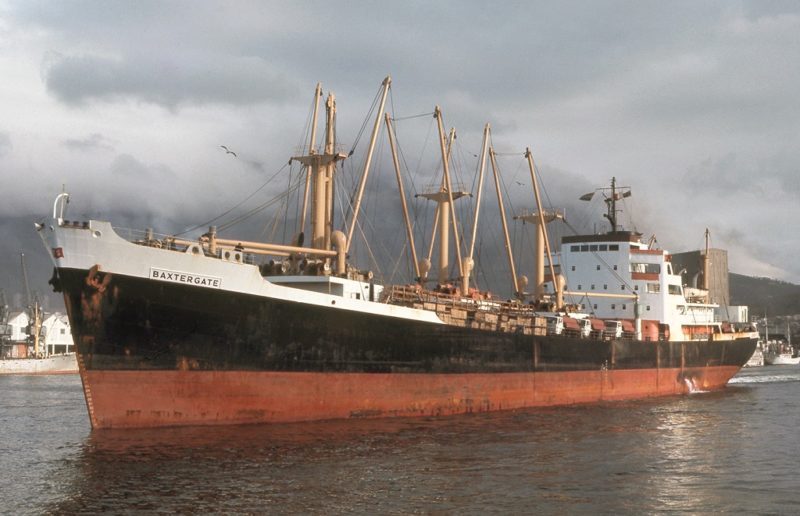
POSTSCRIPT
There are excellent articles worth reading on the two year twice round the world voyages of Maplebank and Irisbank of Bank Line in the January 2017 and July 2018 issues of this magazine by Alan Rawlinson.

If any reader served on tramps or has details of very long voyages and passages of at least a year or two or more without calling at a British port, please send the name of the tramp and details of sailing and arrival dates and cargoes and length of the voyage to the editor. We thank you in advance for increasing the awareness of very long tramping voyages.

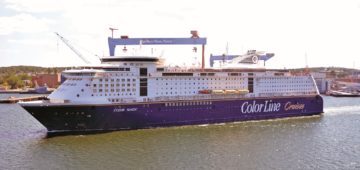


Comments
Sorry, comments are closed for this item